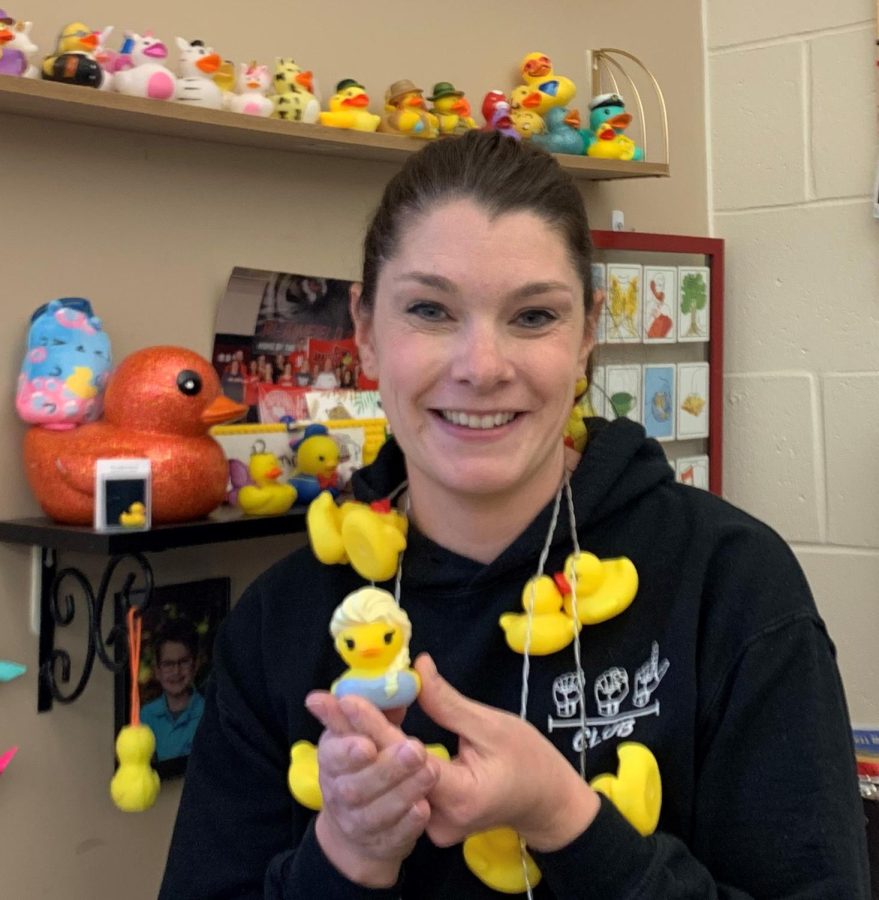Toys: Adults will be kids
ASL teacher Emily Pomrening shows off her vast collection of student-gifted rubber ducks.
January 20, 2023
It all began with a duck. After returning from online learning, a student gave ASL teacher Emily Pomrening a rubber duck. She loved the gift and put it on her classroom board. The duck’s joy was infectious, causing students to bring in ducks of their own. Now, Pomrening has 188 rubber ducks.
Today, toys are no longer just for kids. Many teens and adults enjoy the hobby of toy collecting as well.
In a survey conducted of 141 North students, 63 percent stated they still bought what many would call kid toys.
Between 2020 and 2022, toy sales increased 38 percent according to global market information company NPD. Adults have been a large contributor to this sales growth.
What are the reasons behind this teen and adult toy fascination?
Toys can be expensive, especially for kids who do not have the money to buy for themselves. Teens and adults, though, tend to have some disposable income to be used on leisure or entertainment items. This was the case of North junior Becca Song, who has restored her love for Legos.
“For a while I didn’t really have the time or money for it but now I do,” Song said.
Another motive for purchasing what would traditionally be considered children’s items is that they are a source of joy, which during and after the pandemic is a need for everyone of all ages.
“It can be a really fun and satisfying hobby to collect your favorite toys,” junior Kyle Bledsoe said.
The natural desire to collect has also been an instinct in humans, which could also be a rational for the many teens and adults with toys.
“[In our brains] our frontal lobes are a huge part of our cortex, and they integrate signals. They can take signals about value and add signals about emotion in memory; and that very much explains a lot of human collecting behavior,” experimental psychologist Daniel Krawczyk said.
Today, many satisfy this long time desire to collect via toys.
Toys can also bring about feelings of nostalgia. What a person played with as a child is often revisited as an adult. The act of playing takes the person back to happy and simpler times.
“[My interest in Legos] all started with being a huge fan of ‘Star Wars’,”North band director Tim Hatcher said. “Growing up, I was attached to ‘Star Wars’ toys and building with Legos seemed to be more fulfilling than anything else.”
Toys can provide adults with lots of positive emotions while at the same time decreasing negative ones.
“Sometimes stresses and responsibilities get really heavy, and there is a lot in life that isn’t easy,” Pomrening said. “So, why not take a step back and just kind of make life a little more fun with something as silly as a rubber duck or a set of Legos or a wind up toy?”
The effects of toys in peoples’ lives are not only personally beneficial, but also collectively beneficial. Toys have an ability to improve relationships between people and groups.
“When kids see [the trinkets by my desk] these are things that they can relate to, and I can have conversations with them about,” history teacher Brianne Gallagher said. “It’s the little things that you make a connection with kids on and that is reflective of the toys I have in my room.”
Being a toy fan can be happiness inducing for all ages, although people cannot let that interest take over their lives. There are times when people must put aside the toy interest they have – times where acting grown up is vital.
“It would be kind of interesting if we’re having a presidential debate and our candidates are standing up there with Legos – then we have some concerns,” Gallagher said. “We want people to see us for the mature individuals that we are.”
Some people may consider toys as merely kids’ items, but many people beyond the years of childhood still take satisfaction in them.
“Adult life can often be mundane, so it’s nice to see adults doing what they love,” Bledsoe said.







